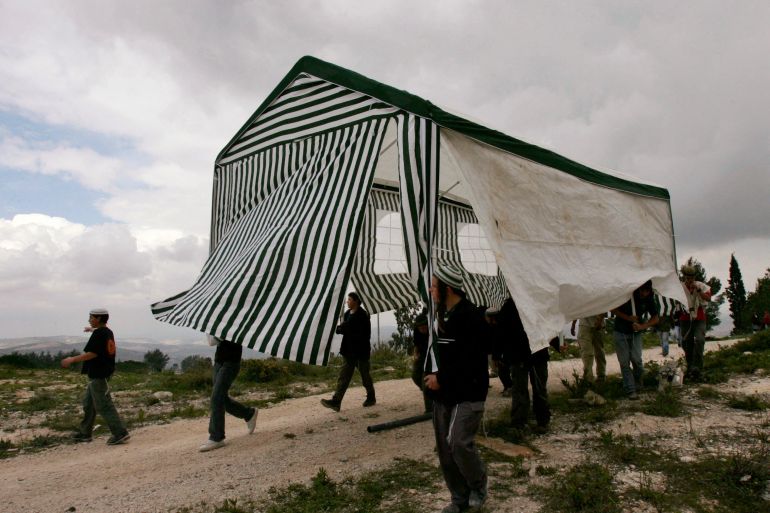Knesset votes to allow Israelis to resettle evacuated outposts
The amendment could see Israelis resettle four outposts in the northern occupied West Bank evacuated in 2005.

The Israeli government has greenlighted an amendment that would allow Israelis to resettle four illegal settlements in the northern occupied West Bank that were evacuated in 2005.
The second and third readings of the legislation were passed late on Monday night in the Knesset, the Israeli parliament, with a majority of 31 votes in support and 18 who voted against.
Keep reading
list of 3 itemsIsraeli, Palestinian officials hold talks amid surging violence
Outrage after Israeli minister says Palestinians ‘an invention’
The development could see Israelis resettle in the evacuated settlements of Homesh, Sa-Nur, Kadim and Ganim, all of which are located around the Palestinian cities of Jenin and Nablus.
While the government has passed the amendment, the Israeli military must still issue a military order allowing Israelis to resettle in these areas.
Between 650,000 and 700,000 Israeli settlers live in hundreds of illegal Jewish-only settlements and outposts, the majority built either entirely or partially on private Palestinian land, across occupied East Jerusalem and the West Bank.
In August 2005, the disengagement plan implemented by then-Prime Minister Ariel Sharon saw Israel remove more than 9,000 settlers in 21 illegal settlements located in the besieged Gaza Strip and the northern West Bank.
The new far-right Israeli government, sworn in at the end of last year, has blown full steam ahead with legislation to legalise nine outposts and expand existing settlements.
Several top figures in the government led by Prime Minister Benjamin Netanyahu are hardline settlers themselves who are pushing a more right-wing agenda, including Finance Minister Bezalel Smotrich who lives in Kedumim near Nablus, and National Security Minister Itamar Ben-Gvir, who lives in Kiryat Arba near Hebron.
The evacuated settlement of Homesh, in particular, has been the focus of tensions between Palestinians and Israeli settlers, who have consistently attempted to re-establish the site permanently.
While all Israeli settlements are considered illegal under international law, Homesh is also considered illegal under Israeli law as the Supreme Court ruled that the land belonged to private Palestinian owners from the nearby village of Burqa.
Despite the evacuation of the outpost, the Israeli army maintains a military base in the location, and settlers are allowed to access it and operate a school there, while Palestinian landowners are forbidden from doing so.
One day before being sworn in, the new Israeli government declared that advancing and developing settlements “in all parts of the land of Israel”, including the West Bank, is a national priority, in a cloaked admission that it had no intention of allowing the creation of a Palestinian state.
On Monday, Smotrich, who oversees the Israeli military’s body in the West Bank in charge of building settlements, denied Palestinians even existed.
On March 1, he said the Palestinian town of Huwara near Nablus “should be wiped out”, days after Israeli settlers carried out what was described as a “pogrom”, in which dozens of Palestinian homes and hundreds of cars were torched, while one Palestinian man was killed and hundreds of others injured.